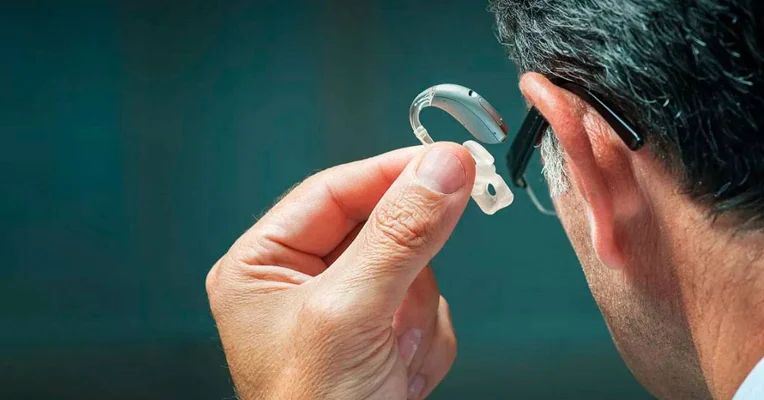Hearing loss is a common issue that affects millions of people around the world. Whether due to aging, noise exposure, or other factors, many individuals are seeking solutions to help improve their hearing. Among the most popular options are hearing aids and natural remedies. While hearing aids are a well-established solution, natural remedies often appeal to those seeking alternative or holistic treatments. In this article, we’ll compare hearing aids and natural remedies to determine which works best for improving hearing health.
Understanding Hearing Aids
Hearing aids are small electronic devices designed to amplify sound for individuals with hearing loss. They are available in various types and styles, and modern hearing aids are equipped with advanced technology to cater to different levels of hearing impairment. Some key features of hearing aids include:
- Amplification of Sound
The primary function of a hearing aid is to amplify sounds so they are easier for the wearer to hear. Hearing aids use microphones to pick up sounds from the environment, which are then processed and amplified before being sent to the ear. - Customization for Different Needs
Hearing aids can be customized to suit different hearing loss patterns. For example, a hearing aid may amplify high-pitched sounds more than low-pitched sounds, based on an individual’s specific hearing loss. - Technology Enhancements
Modern hearing aids come with noise reduction, directional microphones, Bluetooth connectivity, and even artificial intelligence to adjust sound settings automatically. Some models are also rechargeable, making them more convenient for users. - Medical Supervision Required
Hearing aids are typically prescribed by an audiologist or hearing specialist. A professional evaluation is necessary to determine the type of hearing loss and the best hearing aid configuration for the user.
Natural Remedies for Hearing Loss
Natural remedies for hearing loss often focus on improving ear health, reducing inflammation, and supporting the body’s ability to heal itself. While there is no direct scientific evidence that these remedies can fully reverse hearing loss, some individuals find them helpful for managing mild hearing issues or maintaining ear health. Some common natural remedies include:
- Herbal Supplements
Various herbs are believed to have properties that can benefit ear health. For example:- Ginkgo Biloba: Known for its potential to improve circulation, ginkgo biloba is sometimes recommended for tinnitus (ringing in the ears) and other hearing-related issues.
- Garlic: Garlic is thought to have anti-inflammatory properties that can help reduce ear infections and inflammation in the ear canal.
- Zinc: Some research suggests that zinc supplements may help with age-related hearing loss by supporting the immune system and promoting ear health.
- Essential Oils
Certain essential oils, such as lavender or tea tree oil, are believed to help relieve ear congestion or inflammation, which can contribute to hearing problems. These oils can be used in ear drops or diffused into the air. - Dietary Changes
A healthy diet rich in antioxidants, vitamins, and minerals is essential for maintaining overall ear health. Nutrients like Vitamin A, C, E, and Omega-3 fatty acids can promote better circulation in the ear and protect against oxidative stress, which can damage ear cells. - Ear Exercises
Some believe that certain ear exercises or massage techniques can help improve blood circulation in the ear and reduce symptoms of hearing loss. Though not scientifically proven, these practices are often used by individuals seeking holistic solutions.
Comparing Effectiveness: Hearing Aids vs. Natural Remedies
- Efficacy in Treating Hearing Loss
Hearing aids are widely regarded as one of the most effective solutions for individuals with hearing loss. They are designed to specifically address the issue by amplifying sounds and making speech easier to understand. Natural remedies, on the other hand, have not been proven to reverse or cure hearing loss. While some may help maintain ear health or alleviate symptoms like tinnitus or ear congestion, they are not a substitute for hearing aids in cases of significant hearing impairment. - Suitability for Different Levels of Hearing Loss
Hearing aids are suitable for individuals with mild to severe hearing loss and can be adjusted to meet the specific needs of the user. Natural remedies are typically more suitable for managing early-stage or mild hearing issues. They may not provide significant benefits for those with more profound hearing loss or age-related hearing degeneration. - Accessibility and Cost
Hearing aids can be expensive, and their cost often includes the price of consultations with audiologists and ongoing maintenance. Some insurance plans may cover part of the cost, but for many, hearing aids are a significant financial investment. Natural remedies, on the other hand, are generally more affordable and accessible. However, their effectiveness can vary, and some people may find that they do not offer the same level of benefit as hearing aids. - Side Effects and Risks
Hearing aids are generally safe, though some users may experience discomfort or mild irritation as they adjust to wearing them. Natural remedies are also considered safe when used appropriately but can sometimes lead to side effects, particularly if herbal supplements or essential oils are not used correctly. It’s important to consult with a healthcare professional before trying natural remedies to avoid potential interactions with other medications or underlying health conditions. - Holistic Benefits
Natural remedies often provide a holistic approach to health and wellness. For example, a diet rich in nutrients and antioxidants can support overall well-being, and stress reduction techniques can help prevent tinnitus flare-ups. Hearing aids, while effective, primarily focus on amplifying sound and may not offer the same broader health benefits.
Which Is Best?
Ultimately, the best solution depends on the individual and the severity of their hearing loss. For individuals with moderate to severe hearing loss, hearing aids are often the most effective and reliable solution. They are designed to improve the auditory experience and can be customized for each person’s needs.
For those experiencing mild hearing issues or seeking a holistic approach, natural remedies may offer some benefits. However, it’s important to note that they should not be viewed as a replacement for medical interventions or hearing aids in cases of significant hearing loss. In many cases, a combination of both – using natural remedies for ear health alongside hearing aids for sound amplification – may provide the most balanced and effective approach.
Conclusion
While both hearing aids and natural remedies offer potential benefits for managing hearing health, hearing aids are more reliable and effective for addressing actual hearing loss, particularly in moderate to severe cases. Natural remedies can support ear health and alleviate minor symptoms but should be used in conjunction with professional medical advice. For anyone experiencing hearing issues, it’s essential to consult with an audiologist or healthcare provider to determine the best course of action tailored to individual needs.
References
National Institute on Deafness and Other Communication Disorders (NIDCD). (2022). Hearing Aids and Devices. Retrieved from https://nidcd.nih.gov
American Speech-Language-Hearing Association (ASHA). (2021). Hearing Aids: Types, Cost, and How They Work. Retrieved from https://www.asha.org
Mayo Clinic. (2021). Hearing Loss: Causes and Risk Factors. Retrieved from https://www.mayoclinic.org
Journal of Alternative and Complementary Medicine. (2021). Herbal Supplements for Hearing Loss: A Review of Effectiveness. https://doi.org/10.1089/acm.2020.0297

